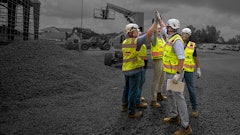
The construction job market is hot right now, with a 6% increase in the market expected between 2020 and 2030, according to the U.S. Bureau of Labor Statistics. Contracting companies may want to take a hard look at their hiring practices to ready themselves for this growth in the market.
Many contractors may have a great business, a stellar reputation, and a top-notch end product, but still find themselves struggling with recruiting talent, vetting possible candidates and retaining the best people for the job. Much of these issues stem from outdated hiring practices that still permeate the industry.
Common Hiring Mistakes
Hiring mistakes are not limited to simply hiring the wrong people, though that can be a costly issue in and of itself. Avoiding that issue altogether takes some awareness of the most common hiring practices that may be outdated or ineffective.
1. Reusing the Same Tired Job Description
If your approach to hiring is simply throwing a vague job description on an online job board and crossing your fingers, you may be losing out on top talent from the get-go. Ensure that you make each job description as in-depth and descriptive as possible. Leaders and owners want to clarify who they are looking for, what skills they want that person to possess, and what that person can expect from the position. The job description should also include what the company is prepared to offer the applicant in terms of pay, benefits, additional skills training or paths offered for professional development.
2. Relying Only On Degrees and Years of Experience
Sometimes, education and experience do not tell the whole story. Many talented people are self-taught in their trades. Many more are skilled, but haven't yet had the chance to get their feet wet in the industry. Taking a chance on someone who lands outside the "degree and experience" circle, but showcases their skills and expresses a strong willingness to learn new ones, could benefit your company in the long run.
3. Failing to Check References
Whenever there is an uptick in construction jobs and people are racing to hire crews, it can be tempting to get people hired quickly and skip the all-important reference check. This approach, however, can end up biting leaders and owners in the end. A person who looks good and sounds good in an interview may have a terrible work history — or worse. It always benefits a company to do their due diligence and check each applicant’s listed references.
4. Failing to Understand the Industry
The construction industry can change on a dime. It can be a boom or completely bust depending on the supply chain, the health of the national economy, and several other factors. Having a finger on the industry's pulse and contractors' needs can help your approach to the hiring process. When desperate times call for desperate measures, for example, the wrong people can be brought into the organization, creating an adverse ripple effect for years to come. Recruiting should be a constant and ongoing process in your business to ride the waves in the industry.
5. Ignoring the Power of Social Media and Technology
Technological advancements and social media are important considerations for more "old-school" construction company owners to remember. A wealth of benefits can be found with investing in social media marketing and technology for hiring purposes, including the ability to cast a wider net for possible talent and, as a result, gain more quality leads.
How Do Outdated Hiring Processes Negatively Impact Business?
When building and scaling a contracting business, having the wrong people around you can sometimes lead to a project’s failure. Every company, regardless of what industry they operate in, are only as strong as their weakest link.
When contractors fail to put out updated or fully-descriptive job listings, they risk sifting through hundreds of applicants who are not right for the position, wasting valuable time and money in the process. Likewise, sticking to outdated ideas of who may be suitable for a job based on arbitrary criteria — such as degrees or years of experience — could lead to the perfect candidate being passed over.
Leaning on outdated hiring practices, and failing to utilize the technological support available to companies looking to hire, can negatively impact a company across all sectors — financially, culturally, and in terms of productivity. If outdated hiring approaches consistently garner the wrong hires, companies will often spend more time trying to fix their mistakes than getting actual jobs done successfully. And once the wrong people are hired, they can wreak havoc on a business.
Vetting, Hiring, and Retaining the Right People
A lot of headaches and financial heartache can be avoided by adequately vetting talent. Proper vetting should begin with the human resources team and include the updated hiring approaches already in place. Too many cooks can spoil the broth, so having everyone — from the company's owner to the head of individual construction teams, to administrative assistants grouped into the hiring process — can muddy the waters. The hiring team should be designed to carry out a company's planned hiring process thoroughly, but should likewise understand the construction industry well. They must know what skills are necessary to complete jobs, and have a fair and balanced approach to the hiring process.
When the job description and listing are detailed, precise, and crafted to target the right individuals, a proper vetting strategy has already begun. Once the candidate is brought into the interview process, companies should take steps to evaluate their work history, check references, and confirm their skills.
Once the right candidates are hired, retaining those candidates cannot be a focus that is brushed to the side. Retaining good candidates saves companies money, and makes them more productive and successful overall.
According to recent statistics, a whopping one-third of new employees at any given company will quit within six months of being hired, making employee retention even more important of a focus. In the wake of The Great Resignation, many companies are seeking newer and more effective ways to retain their valued employees.
Retention must be based on a number of factors, including company culture, benefits, competitive pay, and setting people up for success within the organization. Employees should feel comfortable giving feedback, receiving constructive advice from higher-ups, and knowing their job expectations. The better the lines of communication within an organization are, the better its retention rate will be.
Recruiting and hiring reliable, skilled employees can be one of the biggest challenges within the construction industry. Contractors need to establish transparent processes to handle these hiring challenges in a methodical and effective manner. When capable workers cannot be found to fill voids in employment, work cannot be completed, which greatly affects the company's bottom line. By focusing on updated hiring practices and a clear vision of who they would like to hire and retain, contractors can take complete control of their companies.




















